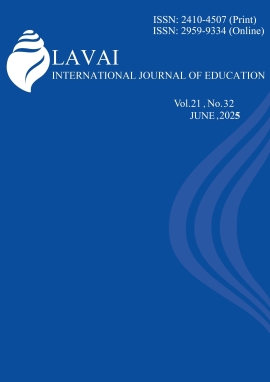From Campus to Crime: Unveiling the Link Between Graduate Unemployment and Social Crimes in Lagos, Nigeria
From Campus to Crime
DOI:
https://doi.org/10.5564/lavai.v21i32.3859Keywords:
Gambling, Graduate Unemployment, Prostitution, Social Crimes, Youth RestivenessAbstract
This study explores the relationship between unemployment and social crimes among university graduates in the Kosofe Local Government Area of Lagos State. The research aimed to answer five key questions and tested corresponding hypotheses. An ex-post facto design was adopted, with a sample drawn from the population of young people in Kosofe. The sample of 400 individuals was selected through purposeful sampling from locations such as bars, betting centres, and okada rider parks. Data was collected using a self-structured questionnaire, the USCG (Unemployment and Social Crimes Graduate) questionnaire, which was validated through face validity. A pilot study in the Ikorodu Local Government Area confirmed the reliability of the instrument. The data were analyzed using Pearson Product Moment Correlation and t-test statistical tools. The findings indicated that there is no significant relationship between graduate unemployment and cybercrime, but a significant relationship was found between graduate unemployment and gambling, prostitution, and youth restiveness. Additionally, no significant gender differences in social crimes among unemployed graduates were observed. The study concluded that graduate unemployment contributes to social crimes such as gambling, prostitution, and youth restiveness. Based on these findings, it is recommended that the government create more industries to address graduate unemployment, thereby reducing cybercrime and other associated social crimes.
Downloads
438
References
References
Ajayi, K. (2015). Unemployment in contemporary Nigeria: A crisis of the modern economy. Nigerian Journal of Social Sciences, 23(2), 45-58.
Akpokighe, R. & Ejovi, A. (2020). Youth restiveness in Nigeria: Implications on sustainable national development. UJAH, 21 (3), 66-89
Alabi, R. (2014). Unemployment, poverty, and crime: Exploring the linkages in Nigeria. African Journal of Economic and Social Studies, 8(1), 14-28.
Alobo, E. E. & Ndifon, R. (2014). Addressing prostitution concerns in Nigeria: Issue, problems and prospects. European Scientific Journal, 10 (14), 36-47.
Azogu, J. (2020). Unemployment and the Nigerian economy: An overview of trends and efforts to address youth unemployment. Journal of Development Studies, 12(3), 112- 125.
Bennetta, S., Farringtona, D. P. & Huesmann, L. R. (2005). Explaining gender differences in crime and violence: The importance of social cognitive skills. Aggression and Violent Behavior, 10, 263 – 288
Estrada, F., Nilsson, A. & Bäckman, O. (2016). The darker side of equality? The declining gender gap in crime: Historical trends and an enhanced analysis of staggered birth cohorts. British Journal of Criminology, 56 (6), 1272–1290.
Igba, I. D., Igba, E. C., Nwambam, A. S., Nnamani, S. C., Egbe, E. U. & Ogodo, J. V. (2018). Cybercrime among University Undergraduates: Implications on their academic achievement. International Journal of Applied Engineering Research, 13 (2), 1144-1154.
Mustapha, S. A. & Enilolobo, O. S. (2019). Effects of gambling on the welfare of Nigerian youths: A case study of Lagos State. Journal of Gambling Issues, 43 (3), 29-44
National Bureau of Statistics (2016). Nigeria Living Standards Survey. Abuja: National Bureau of Statistics.
National Bureau of Statistics (2018). Unemployment report for Q3 2018. Abuja: National Bureau of Statistics.
Obarafor, V. (2019). Cyber Crime in Nigeria, some causes, effects, and solutions. Journal of Global Information Technology Management, 22 (2), 77-81.
Okorodudu, P. (2014). Why youths are addicted to gambling. The Nation. Thenationonlineng.net/why-youths-are-addicted-to-gambling/. Accessed on 3rd/03/2020.
Ome-Egeonu, A. & Samuel, P. K. (2014). Unemployment and youth restiveness in Rivers State: A Review of Port Harcourt Metropolis, Nigeria. Research on Humanities and Social Sciences, 4 (8), 147-152.
Uddin, M., & Uddin, M. (2013). Graduate unemployment in Nigeria: Causes and consequences. Journal of Nigerian Youth Studies, 6(4), 36-47.
Ugal, O., Nwagbara, U., & Uyang, M. (2011). Youth unemployment and the crisis of governance in Nigeria. Nigerian Journal of Political Science, 19(1), 73-85.
UN DESA (2019). Youth unemployment statistics: A report on global trends. United Nations Department of Economic and Social Affairs.
Downloads
Published
How to Cite
Issue
Section
License
Copyright (c) 2025 Adesoji A. Oni, Ikioye L Orutugu

This work is licensed under a Creative Commons Attribution 4.0 International License.
Copyright on any research article in the Lavai - International Journal of Educatioin is retained by the author(s).
The authors grant the Lavai - International Journal of Educatioin a license to publish the article and identify itself as the original publisher.

Articles in the Lavai - International Journal of Educatioin are Open Access articles published under a Creative Commons Attribution 4.0 International License CC BY.
This license permits use, distribution and reproduction in any medium, provided the original work is properly cited.




